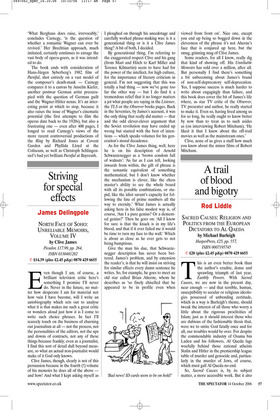Striving for special effects
James Delingpole
NORTH FACE OF SOHO: UNRELIABLE MEMOIRS, VOLUME IV by Clive James Picador, £17.99, pp. 264, ISBN 0330481282 ✆ £14.39 (plus £2.45 p&p) 0870 429 6655 Even though I am, of course, a brilliant television critic here’s something I promise I’ll never do. Never in the future, no matter how desperate I am for material nor how vain I have become, will I write an autobiography which sets out to analyse what it is that makes me such a great critic or wonders aloud just how it is I come to write such choice phrases. In fact I’ll scarcely touch on the business of churning out journalism at all — not the process, not the personalities of the editors, not the ups and downs of contracts, not any of these things because frankly, even as a journalist, I find this sort of detail dull beyond measure, so what an actual non-journalist would make of it God only knows.
Clive James, though, clearly is not of this persuasion because in the fourth (!) volume of his memoirs he does all of the above and how! And what I kept asking myself as I ploughed on through his anecdotage and carefully worked phrase-making was: is it a generational thing or is it a Clive James thing? A bit of both, I decided.
By generational thing, I’m referring to the exaggerated respect Clive and his gang (from Mart and Hitch to Karl Miller and Terence Kilmartin) seem to have had for the power of the intellect, for high culture, for the importance of literary criticism in general. I’m not suggesting that this was totally a bad thing — now we’ve gone too far the other way — but I do find it a tremendous relief that it no longer matters a jot what people are saying in the Listener, the TLS or the Observer books pages. Back in the Seventies, by James’s account, it was the only thing that really did matter — that and the odd clever-clever argument that the Soviet revolution may have ended up wrong but started with the best of intentions — which speaks volumes for his generation’s moral decadence.
As for the Clive James thing, well, here he is on his description of Arnold Schwarzenegger as a ‘brown condom full of walnuts’: ‘As far as I can tell, looking inwards from within, the gift of phrase is the semantic equivalent of something mathematical, but I don’t know whether the mechanism is clever, like the chess master’s ability to see the whole board with all its possible combinations, or stupid, like the idiot savant’s capacity for following the line of prime numbers all the way to eternity.’ What James is actually asking here in his false modest way is, of course, ‘Am I a pure genius? Or a demented genius?’ Then he goes on: ‘All I know for sure is that the knack is in my life’s blood, and that if it ever failed me it would be time to turn my face to the wall.’ Which is about as close as he ever gets to not being bumptious.
Give the man his due, that Schwarzenegger description has never been bettered. James’s problem, and by extension the reader’s, is that he will insist on striving for similar effects every damn sentence he writes. So, for example, he goes to meet an old star called Brian Aherne, whom he describes as ‘so finely chiselled that he appeared to be in profile even when viewed from front on’. Nice one, except you end up being so bogged down in the cleverness of the phrase it’s not Aherne’s face that is conjured up here, but the smug, grinning mug of Clive James.
Some readers, for all I know, really dig that kind of showing off. His Unreliable Memoirs has sold over a million, after all. But personally I find there’s something a bit unbecoming about James’s brand of non-self-deprecatory self-deprecation. Yes, I suppose success is much harder to write about engagingly than failure, and this book does cover the bit of James’s life where, as star TV critic of the Observer, TV presenter and author, he really started to make it. Even so, having lived among us for so long, he really ought to know better by now than to treat us to such asides as (on interviewing Robert Mitchum), ‘He liked it that I knew about the off-trail movies as well as the mainstream ones.’ Clive, none of us gives a stuff how much you know about the minor films of Robert Mitchum.


































































































 Previous page
Previous page